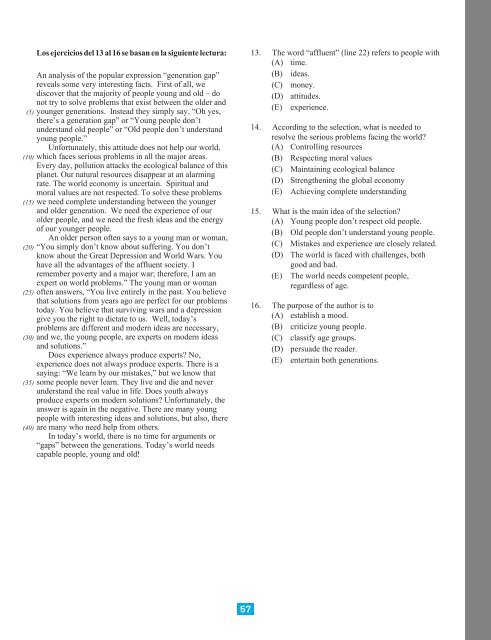o_19hn8vqth19gscct1csn10k7tuoa.pdf
Create successful ePaper yourself
Turn your PDF publications into a flip-book with our unique Google optimized e-Paper software.
(5)<br />
(10)<br />
(15)<br />
(20)<br />
(25)<br />
(30)<br />
(35)<br />
(40)<br />
Los ejercicios del 13 al 16 se basan en la siguiente lectura:<br />
An analysis of the popular expression “generation gap”<br />
reveals some very interesting facts. First of all, we<br />
discover that the majority of people young and old – do<br />
not try to solve problems that exist between the older and<br />
younger generations. Instead they simply say, “Oh yes,<br />
there’s a generation gap” or “Young people don’t<br />
understand old people” or “Old people don’t understand<br />
young people.”<br />
Unfortunately, this attitude does not help our world,<br />
which faces serious problems in all the major areas.<br />
Every day, pollution attacks the ecological balance of this<br />
planet. Our natural resources disappear at an alarming<br />
rate. The world economy is uncertain. Spiritual and<br />
moral values are not respected. To solve these problems<br />
we need complete understanding between the younger<br />
and older generation. We need the experience of our<br />
older people, and we need the fresh ideas and the energy<br />
of our younger people.<br />
An older person often says to a young man or woman,<br />
“You simply don’t know about suffering. You don’t<br />
know about the Great Depression and World Wars. You<br />
have all the advantages of the affluent society. I<br />
remember poverty and a major war; therefore, I am an<br />
expert on world problems.” The young man or woman<br />
often answers, “You live entirely in the past. You believe<br />
that solutions from years ago are perfect for our problems<br />
today. You believe that surviving wars and a depression<br />
give you the right to dictate to us. Well, today’s<br />
problems are different and modern ideas are necessary,<br />
and we, the young people, are experts on modern ideas<br />
and solutions.”<br />
Does experience always produce experts? No,<br />
experience does not always produce experts. There is a<br />
saying: “We learn by our mistakes,” but we know that<br />
some people never learn. They live and die and never<br />
understand the real value in life. Does youth always<br />
produce experts on modern solutions? Unfortunately, the<br />
answer is again in the negative. There are many young<br />
people with interesting ideas and solutions, but also, there<br />
are many who need help from others.<br />
In today’s world, there is no time for arguments or<br />
“gaps” between the generations. Today’s world needs<br />
capable people, young and old!<br />
13. The word “affluent” (line 22) refers to people with<br />
(A) time.<br />
(B) ideas.<br />
(C) money.<br />
(D) attitudes.<br />
(E) experience.<br />
14. According to the selection, what is needed to<br />
resolve the serious problems facing the world?<br />
(A) Controlling resources<br />
(B) Respecting moral values<br />
(C) Maintaining ecological balance<br />
(D) Strengthening the global economy<br />
(E) Achieving complete understanding<br />
15. What is the main idea of the selection?<br />
(A) Young people don’t respect old people.<br />
(B) Old people don’t understand young people.<br />
(C) Mistakes and experience are closely related.<br />
(D) The world is faced with challenges, both<br />
good and bad.<br />
(E) The world needs competent people,<br />
regardless of age.<br />
16. The purpose of the author is to<br />
(A) establish a mood.<br />
(B) criticize young people.<br />
(C) classify age groups.<br />
(D) persuade the reader.<br />
(E) entertain both generations.<br />
57



